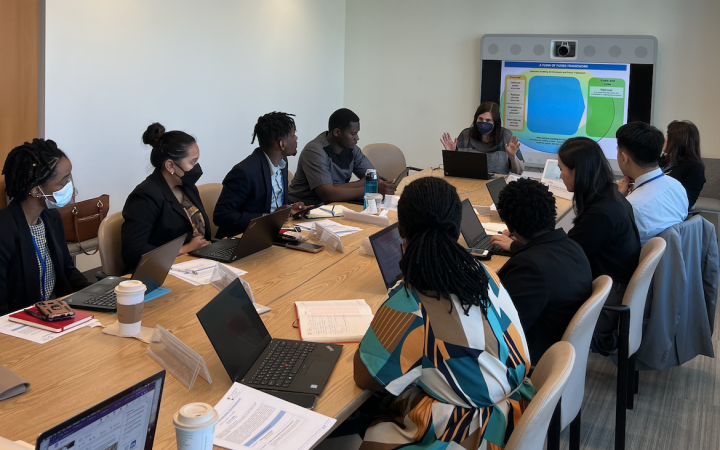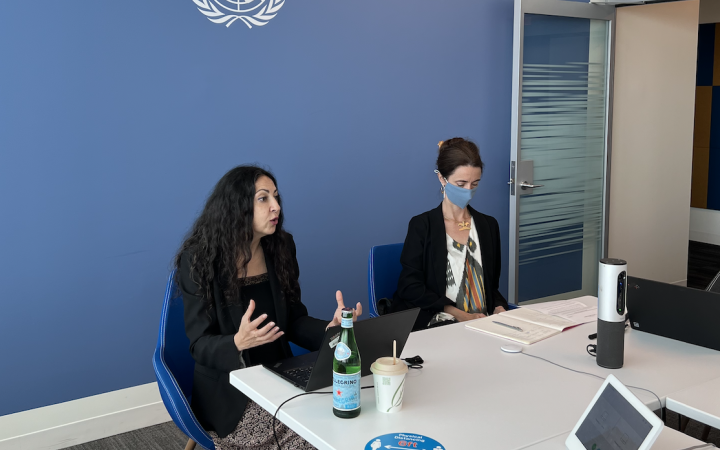10 & 17 June 2022, New York, United States — The United Nations Institute for Training and Research (UNITAR) held another session of the weekly training workshops for the 2022 President of the General Assembly Fellowship for HOPE (Harnessing Opportunities for Promoting Empowerment of Youth) — UNITAR NYO’s flagship initiative. Fellowship workshops are held every Friday at the United Nations Headquarters and feature multiple distinguished high-level speakers from various branches of the United Nations.
On Friday, June 10th, the PGA fellows were joined in person by Ms. Sharon Spiegel, Ms. Mariangela Parra-Lancourt, Mr. Daniel Platz, Ms. Anjali Rangaswami, Mr. Mathieu Verougstraete, Mr. Sander Glas, Ms. Cornelia Kaldewei, Mr. Peter Chowla and Ms. Natalia Aristizabal Mora to discuss the topic of Financing for Sustainable Development.
The Financing for Development process is centered around supporting the follow-up to the agreements and commitments reached during the three major international conferences on Financing for Development: in Monterrey, Mexico in 2002; in Doha, Qatar in 2008; and in Addis Ababa, Ethiopia in 2015. The process also follows up on the financing for development-related aspects of the outcomes of major United Nations conferences and summits in the economic and social fields, including the 2030 Agenda and the Sustainable Development Goals (SDGs). Financing is about policy and framework, Ms. Spiegel said, and the goal is to keep developing countries continuously developing with the help of the United Nations. Ms. Mariangela Parra-Lancourt, Chief of Strategic Engagement and Policy Integration Branch (SEPIB), Financing for Sustainable Development Office (FSDO), and United Nations Department of Economic and Social Affairs (UNDESA), talked about the current processes of the Financing for Development office and the framework of the flow of funds.
According to Mr. Verougstraete, it is essential to bring international and global thinking into domestic investment policies in order to create competition and an easier transition into market. Mr. Daniel Platz then spoke about Development Cooperation while Ms. Cornelia Kaldewei and Mr. Peter Chowla discussed debt, its causes, and the current issue in debt before and after the COVID-19 pandemic. Ms. Natalia Aristizabal Mora, Inter-Regional Advisor of the Policy Analysis and Development Branch explained the role of the Integrated National Financing Framework (INFF), which brings together all sources of financing.
The session on Financing for Sustainable Development was engaging thanks to the guest speakers who made such an extensive topic fit into a few short hours for the fellows. This workshop provided an overview on the history of the major milestones in Financing for Development process along with the issue of Financing for Sustainable Development, the Financing for Development process and how it links to other major intergovernmental outcomes, particularly the 2030 Agenda.
The session on 17 June centered around the work of United Nations Resident Coordinators. The Resident Coordinator system ensures the coordination of all organizations of the United Nations dealing with operational activities for development at the country level, regardless of the nature of their presence in the country. It encompasses the UN Resident Coordinator (RC), the UN Country Team and RC Office (RCO) and is served by the UN Development Coordination Office (DCO). The session was led by a distinguished group of panelists from the United Nations Development Coordination Office — Ms. Silva Bonacito, Ms. Helena Fraser, Ms. Allegra Baiocchi, Mr. Arun Jacob, and Ms. Poorti Sapatnekar.
The Resident Coordinator is the designated representative of – and reports to – the UN Secretary-General, with the responsibility to lead UN Country Teams, coordinate UN support to countries in their implementation of the 2030 Agenda, and ensure system-wide accountability on the ground for the UN Development System Cooperation Framework. The workshop focused specifically on the work of the RC. Fellows were given the opportunity to learn from current and former RCs who explained the role and shared their experience and insights. The fellows commended the insightfulness of the workshop and the relevance of the topic to their chosen field — the facilitators were able to give firsthand experiences as Resident Coordinators and offered profound explanations to each of the fellows’ inquiries.
The past two sessions gave a lasting impression to the fellows — the topics discussed showed relevance to their field as diplomats and future ambassadors of their respective countries. The weekly sessions of the HOPE Fellows will continue every week until August.



